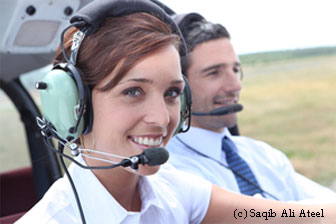Do you need to take a flight aptitude test before becoming a pilot?
The answer to that question depends on what type of pilot you wish to come. If you merely want to obtain your Private Pilot’s Licence or become a commercial pilot, you don’t need to take a flight test. However, that doesn’t mean it is not a good idea. Here we will learn more about the armed forces requirements and what the test involves too.
Why the need to take a flight aptitude test?
There is one reason for taking a flying aptitude test, but with different objectives depending on your intentions. If you want to get a private pilot’s license or become a commercial pilot, it is a good idea to take a flying aptitude test. It can tell you whether you are suited to such goal and what skills you may need to improve. If you want to become a military pilot, the other objective is financial.
In any walk of life, it costs money to train as a pilot. As a military pilot that cost is even more significant. From a financial standpoint, taking a flight aptitude test becomes imperative. If you fail your flying aptitude test, the chances are you will not make a good pilot. In knowing that, the services are unlikely to risk spending a lot of money on potentially wasted training.
This aptitude test is not intended as a means to deny you the right to become a pilot. It is more a case of establishing if you are capable of becoming one. If not, then the options to remain within the same environment are still broad and extensive. In basic terms, it is not easy to become a pilot, and because of the cost involved, the success rate of all trainee pilots needs to be as high as possible.
Of course, that is not all, depending on which armed services you wish to join. In the USA, before you can enter any armed service, you have to pass your ASQT or Armed Services Qualification Test. If you wish to become an Air Force or Navy Pilot, then you will also want to do well in your ASVAB or Armed Services Vocational Aptitude Battery. However, in the UK there is no initial test required to be taken before joining any of the armed forces.
However, like the USA, there are aviation aptitude tests that have to be passed before you will be considered for pilot training in the UK.
What does flight aptitude testing test and what tests are there?
The following is a list provided courtesy of the USAC that will give you a clear indication of the subject areas tackled in a military flight aptitude test:
- Synonyms
- Verbal Analogies
- Reading Comprehension
- Arithmetic Reasoning
- Math Knowledge
- Data Interpretation
- Mechanical Comprehension
- Electrical Maze
- Scale Reading
- Instrument Comprehension
- Block Counting
- Table Reading
- Aviation Information
- Nautical Information
- Rotated Blocks
- General Science
- Hidden Figures
- Background Information
- Self-Description
- Biographical Inventory
- Complex Movements
- Cyclic Orientation
- Spatial Apperception.
It is a comprehensive list, but do not be put off.
To simplify your task, you can practice with flight aptitude tests available on this website. You will familiarize yourself with the types of questions, patterns and reasoning styles. Like any other test, this practice shall prepare you for your real-life psychological session.
Interestingly, a single aptitude test is not considered sufficient to measure your capabilities and aptitude for flights. The psychologists shall allow you to take a test which is related to your applied section of the flight. The AFOQT or Air Force Officer Qualifying test is self-explanatory. It comprises of 380 questions and continues for four and a half hour. The AFAST, or Alternate Flight Aptitude Selection Test, is taken by those who want to become a helicopter pilot in the Air Force. This test comprises 200 questions and lasts seventy minutes.
Finally, there is the Navy and Marine Corps Aviation Selection Test Battery. This flight aptitude test is used by the US Marine Corps, the Army, and the Coast Guard when choosing appropriate officer candidates for flight training. This flight aptitude test has 208 questions and lasts for 90 minutes. The Air Force also uses this particular test as an additional selection process for the OCS program.
If you have ever watched a display flight like the Thunderbirds in the USA or the Red Arrows in the UK, you will quickly see why not everyone can become a pilot. These pilots may be the best of the best, but those who don’t make it to that level are still remarkable people. Anyone who becomes a pilot in the armed forces deserves total respect for the job they do and the people they protect.
Practice with Free Aptitude Tests
Share Your Thoughts!
We find value in differences between learning, interpreting and overall opinions. Please share your thoughts freely about this topic, but always remain respectful. You can preview and edit on the next page before your submission is sent in. You will also be informed about this site's privacy policies.
Thank you for your contribution.
Recent Articles
-
What type of test did I take
Apr 04, 22 04:09 AM
I was given a psychological test years ago, but wasn’t told what it was for. The rating used a bell curve and my score fell in the above average not yet -
ﹰﹰﹰﹰﹰﹰﹰGOOD
Aug 13, 21 03:20 PM
Since the enneagram test helps people to understand their strength and weaknessess. And helps them remove their weaknesses then the test is good -
Knowing the inner me
Aug 13, 21 03:17 PM
Sometimes I ask myself that is this my behaviour or not? Because I am really shy and I lack confidence, I find it hard to socialize with other people.I

